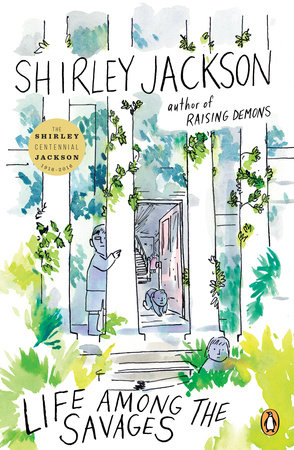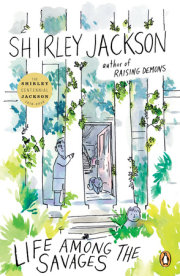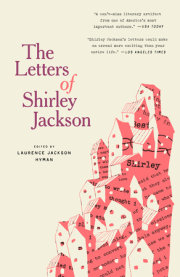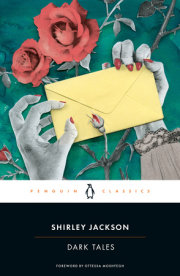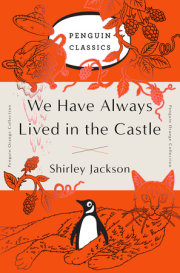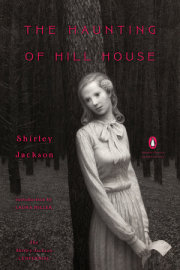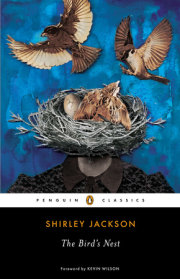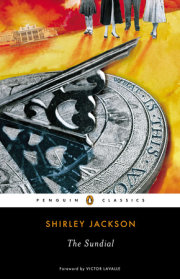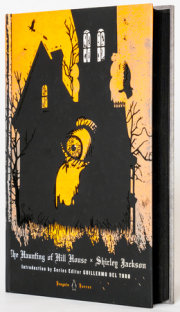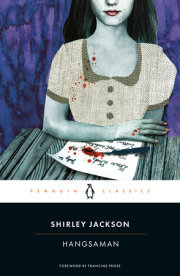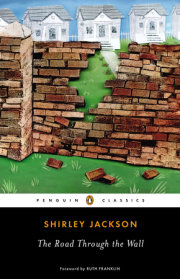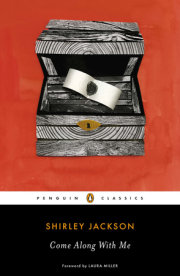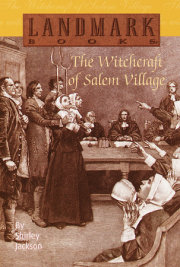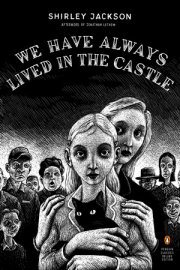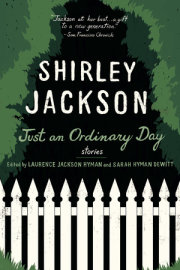One
Our house is old, and noisy, and full. When we moved into it we had two children and about five thousand books; I expect that when we finally overflow and move out again we will have perhaps twenty children and easily half a million books; we also own assorted beds and tables and chairs and rocking horses and lamps and doll dresses and ship models and paint brushes and literally thousands of socks. This is the way of life my husband and I have fallen into, inadvertently, as though we had fallen into a well and decided that since there was no way out we might as well stay there and set up a chair and a desk and a light of some kind; even though this is our way of life, and the only one we know, it is occasionally bewildering, and perhaps even inexplicable to the sort of person who does not have that swift, accurate conviction that he is going to step on a broken celluloid doll in the dark. I cannot think of a preferable way of life, except one without children and without books, going on soundlessly in an apartment hotel where they do the cleaning for you and send up your meals and all you have to do is lie on a couch and—as I say, I cannot think of a preferable way of life, but then I have had to make a good many compromises, all told.
I look around sometimes at the paraphernalia of our living—sandwich bags, typewriters, little wheels off things—and marvel at the complexities of civilization with which we surround ourselves; would we be pleased, I wonder, at a wholesale elimination of these things, so that we were reduced only to necessities (coffeepot, typewriters, the essential little wheels off things) and then—this happening usually in the springtime—I begin throwing things away, and it turns out that although we can live agreeably without the little wheels off things, new little wheels turn up almost immediately. This is, I suspect, progress. They can make new little wheels, if not faster than they can fall off things, at least faster than I can throw them away.
I remember the morning, long ago, when the landlord called. Our son Laurie was three and a half, and our daughter Jannie was six months old, and I had the lunch almost ready and the diapers washed, along with the little shirts and the nightgowns and the soakers and the cotton blankets, and they were all drying on the line (and I don’t care what anyone says, that’s a morning’s work, when you consider that I had also made brownies and emptied the ashtrays) and then the landlord called. He was a kindly man, and a paternal one, so that he asked first about my health, and my husband’s health, and then he asked how was our boy? and how was the baby? and when I said that we were all fine, fine, he said that of course we were aware that our lease was up? I said well, no, we hadn’t really known that our lease was up. So he said well, he supposed that we hadn’t looked at the lease recently and I (wondering if that was the paper Laurie had torn up and eaten) said that it had been quite a while, really, since we sat down together and read over our lease. That was too bad, he said. Wasn’t it, I said. Because, he said, his voice gentle, the apartment had been rented to someone else. After a minute I said rented? to someone else? Then I laughed and said what were we supposed to do—move? He said well, yes, we were supposed to do just that.
“Naturally,” he went on, “we could evict you if we wanted to.”
“You could?” I was thinking of letters to the president, appeals for the sake of our two small children. “We’d much rather you’d just move out,” he said.
“But where?”
He laughed genially. “Ask me another,” he said. “Apartments are mighty tough to find these days.”
“I suppose we could take a look around,” I said dubiously. Letters, I was thinking, sue them for the piece of plaster that fell on my husband while he was shaving: lawyers.
“We’ll expect to take possession around May first,” he said.
“Today is March twenty-fifth,” I said.
“That’s right,” he said. “Rent almost due,” and he laughed again.
The next day we got a letter saying that it was “first notice of warning to evict.” I began to think in terms of pouring boiling oil from the windows and barricading the doors with the dining room table. What made both of us even angrier was the fact that we had never had any intention of renewing our lease, but had planned vaguely on moving as soon as we found another place. “The very idea,” I told my husband indignantly, “renting this apartment to someone else without fixing that broken step. The one on the stairs.”
“Leave a note for the new people about the cockroaches,” my husband advised. He also advised strenuously against bringing suit for some undetermined reason (the piece of plaster? the neighbor’s radio?) and said, patting me on the shoulder, that he knew how anxious I had been to find another place.
Our fondest dream had been to move to Vermont, to a town where a couple we knew had settled and from which they had written us glowing accounts of mountains, and children playing in their own gardens, and clean snow, and homegrown carrots, and now suddenly it looked overwhelmingly as though we moved either to Vermont or to a tent in the park. I called half a dozen city agents, and they all laughed as gaily as our landlord had laughed; “Got any relatives you could move in with?” one of them asked me.
Finally, two hardy adventurers making for unexplored territory, we left the children with their grandparents, got ourselves and our suitcases and our overshoes onto a train at the station, and set out, an advance scouting party, for the small town where our friends lived, and where the mountains were so high and the snow so clean. There was no doubt, we discovered, about the snow. Our city overshoes went in over their heads as we stepped off the train, and for the three days we were there we both went constantly with damp feet and small bits of ice melting against our socks.
One nice thing was, there were lots and lots of houses available. We heard this from a lady named Mrs. Black, a motherly old body who lived in a nearby large town, but who knew, as she herself pointed out, every house and every family in the state. She took us to visit a house which she called the Bassington house, and which would have been perfect for us and our books and our children, if there had been any plumbing.
“Wouldn’t take much to put in plumbing,” Mrs. Black told us. “Put in plumbing, you got a real nice house there.”
My husband shifted nervously in the snow. “You see,” he said, “that brings up the question of . . . well . . . money.”
Mrs. Black shrugged. “How much would plumbing cost?” she demanded. “You put in maybe twelve, fifteen hundred dollars, you got a real nice house.”
“Now look, if we had fifteen hundred dollars we could give an apartment superintendent—” my husband began, but I cut in quickly, “You must remember, Mrs. Black, that we want to rent.”
“Rent, did you?” said Mrs. Black, as though this proved at last that we were mere fly-by-nights, lookers at houses for the pleasure of it. “Well, if I was you folks, small children and all, well, I’d buy.”
“But money—” my husband said.
“Money?” said Mrs. Black scornfully. “Two, three thousand dollars.” She thought. “On the other hand,” she said brightly, “if you was to fix it up yourselves—set in the plumbing, do a little painting, fix a few things maybe, you might cut your price down considerable.”
She was looking directly at my husband as she said this, and he smiled weakly and nodded, obviously for that brief moment taken in by the notion that he might himself set in the plumbing. “You got to figure,” Mrs. Black pursued, “you put down maybe two, three thousand dollars, you get a first mortgage from Henry Andrews down to the bank, you sign to put in a few improvements—all you got to figure there is title, I think, and maybe equity, Henry Andrews can tell you just exactly what. Taxes, o’course. Insurance, you’d want, and then you figure heat and electric, and maybe you could get Bill Adams to put in the plumbing for you for less on account it’s his wife’s sister owns the house, and there you are. Ten, fifteen years, you got a real nice house here, and you own it. Other way, you’d still be paying rent.”
“But money—” my husband said.
Mrs. Black continued smoothly, “Other hand,” she said, “you might like the McCaffery house. Now there’s one with plumbing.”
The McCaffery house may have had plumbing for all we ever knew; we could not get to it because the dirt road leading up to the top of the hill where the house sat was impassable with snow. “Have to clear this out some,” Mrs. Black said, as we all stood at the bottom of the hill looking up at the house.
A Mr. Miller, who wore a leather jacket and a cap with earmuffs, took us to see the Donald house. This was a pretty place, set in an acre of marsh, but we unreasonably required a furnace, which Mr. Miller figured we ought to be able to put in for maybe two, three thousand. “Heat it with stoves, I would,” he said. “Don’t cost’s much to run’s a furnace.”
“Money—” my husband said.
“Might be,” Mr. Miller said, looking doubtfully at my husband, “might be you’re handy-like around a house?”
Mr. Faber, who wore checked hunting pants and rolled his own cigarettes, showed us the Grant house, which had only three rooms and a lovely garden, and the Exeter house, which was big and rambling and heated and even had plumbing. “Real nice house here,” Mr. Faber said as we stood, wondering, in the panelled dining room. “Priced at fifty thousand, but he ought to come down some on that.”
“Fif—” said my husband.
“Well,” Mr. Faber said sadly, “I didn’t suppose you cared to go that high, but I figured you’d enjoy seeing it.”
Mrs. Black, who picked us up again at nine the next morning, took us to see the Hubbard house, which had been made over from an old farmhouse, and had lovely floors and high ceilings and fireplaces and clean colored walls and even a garage, but no bedrooms. “The living room alone is seventy foot,” Mrs. Black said. “Studio type house, you might say.” She hesitated. “Matter of three, four thousand to build on a wing,” she suggested hopefully.
“But we want to rent,” I said, wailing. “We don’t want to put things in and build things on and plough things out, we want to rent a house that’s all put together before we move in.”
Mrs. Black sighed. “There’s a nice place, the Exeter house,” she said at last. “Real big, suit you folks fine. Priced at—”
By the end of the second day we had even looked at a barn which someone had thought he might just rent out, but there were two cows and a tractor in that, and even Mrs. Black’s optimistic suggestion that we could easily make up the stalls into bedrooms for the children could not encourage us.
“Well,” Mrs. Black said as she said goodbye to us in front of our friends’ house, “I guess you folks are pretty lucky you got a place to live in the city.”
Wearily, that evening, we sat in the comfortable living room of our friends’ house, sheltered beneath a roof, securely, though temporarily, housed, and tried frantically to plan. It was April second, we had had our second notice of warning to evict, and we had begun to think wildly of renting a trailer, or having the children live with their grandparents, or borrowing a tent and a canoe and exploring the Great Lakes.
“Exeter,” my husband said, miserably, “Exeter, McCaffery, Grant. Bassington, Hubbard, Donald. McCaffery, Bassington, Donald, Grant. Exeter, Hubbard—”
“We just can’t live in a house without plumbing,” I said.
“Or a furnace,” my husband said. “McCaffery, Hubbard—”
“Maybe we could get an extension from our landlord,” I said without hope. “Maybe if he knew how hard we tried he might let us have a few weeks more.”
Our friends sat, shaking their heads sympathetically, although their own home was paid for and firmly fixed upon its foundations, with its furnace working smoothly and its plumbing in repair.
“If we only had some money,” my husband said and everyone sighed.
We had to take the train home the next day, and on the way to the station I stopped in at the one grocery in town for cigarettes. After I had paid him the grocer said, “Couldn’t find a place, I guess.”
“No,” I said, surprised, although I was to learn later that the grocer not only knew our housing problems, but the ages and names of our children, the meat we had been served for dinner the night before, and my husband’s income.
“Too bad you weren’t interested in the Fielding place,” the grocer said.
“We didn’t even hear about it,” I said.
“Would have called you,” the grocer said, “but Mae Black, she said you only wanted to buy. Not for sale, the Fielding house.”
“What’s it like?”
The grocer waved his hand vaguely. “Old,” he said. “Been in the family a long time.” He accepted a nickel from a small boy, helped him take the wrapper off a popsicle, and said, “Whyn’t you call old Sam Fielding? I bet he’d be real glad to take you over there.”
There was only one train a day from the town. If we stopped long enough to look at the Fielding house we would not be able to leave until tomorrow; I hesitated, and the grocer said, “Won’t do any harm to look, anyway.”
I went outside and put my head in through the window of the car where my husband was waiting with our host and hostess. “Ever hear of a house called the Fielding house?” I asked.
“The Fielding house?” said our hostess, and our host said, “What on earth do you want with that?”
“What’s the matter with it?” I asked.
“Well,” said our hostess, “it’s a thousand years old, I think.”
“A million,” said our host. “It’s . . .” He gestured helplessly. “It’s got these big white pillars across the front,” he said.
“Is there a house in back of the pillars?” my husband asked. “Because if there is, and it has plumbing and a furnace and bedrooms and they’ll rent it to us, we’re going to be living there.”
The Fielding house was a very old house about a mile out of town. It was the oldest in its neighborhood and the third oldest in the township; we had passed it, we realized with something of a shock, several times when we drove with Mrs. Black or Mr. Miller or Mr. Faber to look at other houses. It had been built—I looked it up in the town history shortly after we moved in, when I was vainly trying to come to terms with it—about eighteen-twenty, by a doctor named Ogilvie, who set it up as a manor house in the center of a great farm. The classical revival was upon the county then, and Doctor Ogilvie modeled his house after, presumably, a minor Greek temple; he set up the four massive white pillars across the front, threw wings out to both sides and then, with true New England economy, left the house only one room deep behind its impressive facade. When the Ogilvie family died off or moved away, as it did shortly after the house was built, it passed into the hands of a family named Cortland, who sold off most of the farm land and changed Doctor Ogilvie’s woodshed into a summer kitchen. The Cortlands eventually sold the house to a family named Fielding, who promptly bought back all the surrounding land, now somewhat built up with houses, rented the houses out, set up a lumber mill on the river that used to run across Doctor Ogilvie’s farm, and hired their tenants as employees. It seemed from the town records that the original Fielding had been a farmhand for Doctor Ogilvie, and the family no doubt had their eyes on the place even then. As the town developed the Fieldings became wealthier, and eventually the final generation of authentic Fieldings died off in the house and the entire property went to three cousins, all of whom lived in severely modern houses in neighboring towns, doing handsomely on their interests in the lumber mill.
When the manor house was put up for rent it was as though a vital part of the town had slid imperceptibly into the river, and a great coolness arose between the Fielding heirs and the Bartletts, who owned the second oldest house in town. During the worst housing shortages, when the lumber mill was going full blast night and day, the old manor house on top of the hill stayed empty, its white pillars sagging and its driveway choked with dead leaves or smooth with unmarked snow. When we saw it first it looked faintly ridiculous, and even the fences on either side and along the front leaned a little bit away from it, without actually renouncing it, as though they deplored it privately and yet wanted to present a unified front to the world of inhabitants. Sam Fielding was the only one of the Fielding cousins who retained the family name and so it had apparently been felt that he was the logical one to show us the house; he was a small quiet old man with the slow voice of the thoughtful Vermonter, and he stood with us at the foot of the lawn and he and my husband and I stared silently up at the huge pillars, the spread wings, the iron weather vane which stared mutely back at us.
“That’s it,” said Mr. Fielding undeniably. “I’d like to get some use out of it.” He looked away quickly, as though avoiding an accusing glance from the house. “Good house,” he added.
“It looks so . . .” I hesitated. “Imposing,” I said finally.
“Imposing,” Mr. Fielding agreed. He declined a cigarette from my husband and took out a cigarette of his own; it was the same brand, but it was his own. “Clean it up some,” he said, nodding his head at the house.
“May we go inside?” I asked. “If we were interested in the house, I’d rather like to see the inside.”
“Door’s open,” Mr. Fielding said.
We hesitated, my husband and I. Mr. Fielding settled himself comfortably on a tree stump and crossed his legs. “Door’s open,” he said again.
Together my husband and I made our way to the front door, avoiding just in time the broken step that led onto the porch. Once among the pillars the sense of the house came upon one with a rush; here was a house, as compared with the makeshift McCafferys and Exeters. My husband tried the front door tentatively, and it swung open. Gingerly, watching out for broken floorboards, we went inside, into a wide hall shadowed by the pillars and backed by a straight, lovely, colonial stairway; somewhere to our right were a carpet flooded with red cabbage roses and a harmonium, under dark old pictures which seemed to lean forward a little to watch us, surprised; we went into a kitchen where a monumental ironwork stove threatened to fall on us, and in the kitchen there was a table thick with dust and on it were a dusty cup and a plate with two solid, ancient doughnuts on it. There was a chair pushed a little away from the table.
“I’m sorry we stayed,” I said to my husband earnestly, my hands shaking as I looked at the two hideous doughnuts, “we interrupted their lunch, let’s leave right away.”
“If it weren’t the only house in town . . .” he said, but he followed me rapidly outside.
Mr. Fielding rose to meet us as we came back down between the pillars, and when we were near him he said, “Weather’s closing in. Snow before morning.” He escorted us solemnly to the station, discussing the weather, and as our train came in he remarked, “Fix her up some, then, before you folks come in the spring.”
“Tell me,” I said, “how long since anyone’s been in that house?”
“Not since the old man died,” he said. “Four year I figure that might be.”
“But to straighten it up?” I insisted. “Look over his things, or anything?”
“Never really figured it would rent,” he said thoughtfully. “No sense rushing things.”
He waved to us kindly when we got onto the train. During most of that next two weeks I held firmly to the impractical conviction that I didn’t care if it was the last house in the town, or in the world for that matter, and I didn’t care if it meant living in the park, I was not going to live in a house with two petrified doughnuts. The following week, however, we received a letter from Mr. Fielding, saying that the house was being fixed up, and did we feel that fifty dollars a month was too much rent?
“You seem to have taken the house,” I said unjustly to my husband.
“It’s probably because we went inside,” he said. “No one else has ever gone inside, and that probably constitutes a lease.”
A week later we received another letter from Mr. Fielding, saying that the house was all ready for us, except for the outside, which would be painted when the weather opened up. Since we had not answered his last letter, he figured that his rent was too high, and did we think we could manage forty?
A strong sense of guilt impelled my husband to write back immediately saying that fifty dollars a month was fine; “before he gives it to us,” he told me.
“But I’m not—” I said, realizing that of course I was.
I came up on the train, a day after my husband. I brought with me a wildly excited Laurie, and Jannie, in a basket; and all the way up on the train, crushed in between Laurie and the baby’s basket and the suitcases and the sandwiches, I was wondering if anyone had thought to take away the kitchen table and the doughnuts: my husband had promised that if we really couldn’t stand it we could try once more to find something in the city. Mr. Fielding was with my husband to meet us at the station, and when I saw Mr. Fielding again the whole clear sense of the house came back to me and I was ready to turn around and go back right then. He smiled at me cheerfully, said, “Afternoon, young fellow,” to Laurie, and stared gravely at the baby for a minute; she stared back at him, and then he nodded to me and said reassuringly, “Fixed her up some.”
I knew what he meant when I saw the house. It had been literally scraped clean, down to the wood in the walls. Mr. Fielding had put on new wallpaper, rich with great gorgeous patterns, the windows had been washed, the pillars straightened, the broken step repaired, and a cheerful man in the kitchen was putting the last touches of glittering white paint to the new shelving; there was a brand new electric stove and a new refrigerator, the floors had been repaired and varnished, a hornets’ nest had been removed from the farthest pillar on the right. The lawn was just beginning to show green, and Laurie ran in and out between the pillars, touching every one, and then, shouting, up and down the straight stairway. In her basket Jannie smiled, looking up at the sky over the trees.
“It’s beautiful,” I said to Mr. Fielding, almost in tears. “I thought it would look like it did before.”
“Needed some work done,” Mr. Fielding agreed. Then he nodded at the new kitchen stove and said, “Did the old place good.”
Just then our moving van arrived, and the three muscular, brazen fellows who had looked so natural carrying our furniture out of the apartment became abruptly incongruous carrying our small chairs and tables in between the pillars.
“Put in some more plumbing, too,” Mr. Fielding said, and departed.
For the first week or so things were completely at cross-purposes. Our furniture, which had been more than adequate for a city apartment, here spread all too thinly among the echoing rooms of the house, and we had to fill out with odd tables and chairs bought from Mr. Fielding and from nearby second-hand shops. The house had grown enormously, I later learned, from Doctor Ogilvie’s original structure. The Cortlands had added the summer kitchen, but the Fieldings had added on and on, so that the room which had been the summer kitchen, for instance, and hitched on to the back of the house in the first place, was now smack in the middle, tucked in among larger and sturdier rooms, and was no longer a kitchen at all but only a dark little room which was sometimes difficult to find. We had only three beds and we had six bedrooms, so Mr. Fielding sold us, for fifty cents, a bed that had been only recently taken out of the house and put into one of the capacious barns. We tried to buy the harmonium but the Fieldings had sold it to an antique dealer; we did buy the carpet with the cabbage roses, since it was the only one which would fit into the vast desert of the parlor; we declined, with one voice, the old kitchen table. All these things, the ones that had been in the house before, and other things which had been in similar old houses and knew their ways, fell naturally into good positions in the rooms, as though snatching the best places before the city furniture could crowd in. No matter how much we wanted to set our overstuffed chairs on either side of the living room fireplace, an old wooden rocker that Mr. Fielding had given us insisted upon pre-empting the center of the hearth rug and could not in human kindness be shifted. An old highboy, which was a contemporary of the rocker although it had come from a barn across town, took over the living room corner near the rocker, and the two of them lived there in silent companionship.
After a few vain attempts at imposing our own angular order on things with a consequent out-of-jointness and shrieking disharmony that set our teeth on edge, we gave in to the old furniture and let things settle where they would. An irritation persisted in one particular spot in the dining room, a spot which would hold neither table nor buffet and developed an alarming sag in the floor when I tried to put a radio there, until I found completely by accident that this place was used to a desk and would not be comfortable until I went out and found a spindly old writing table and set a brass inkwell on it.
There was a door to an attic that preferred to stay latched and would latch itself no matter who was inside; there was another door which hung by custom slightly ajar, although it would close goodhumoredly for a time when some special reason required it. We had five attics, we discovered, built into and upon and next to one another; one of them kept bats and we shut that one up completely; another, light and cheerful in spite of its one small window, liked to be a place of traffic and became, without any decision of ours, a place to store things temporarily, things that were moved regularly, like sleds and snow shovels and garden rakes and hammocks. The basement had an old clothesline hung across it, and after the line I put up in the back yard had fallen down for the third time I resigned myself and put up a new line in the basement, and clothes dried there quickly and freshly. We stocked the woodshed, since we had four fireplaces, and my husband discovered an odd pleasure in splitting wood, and the sound of an axe in the woodshed echoed agreeably through the kitchen. One bedroom chose the children, because it was large and light and showed unmistakable height-marks on one wall and seemed to mind not at all when crayon marks appeared on the wallpaper and paint got spilled on the floor. We put bookcases in the little dark room downstairs, and after the second week my husband got so he could find it nine times out of ten.
It was a good old house, after all. Our cats slept on the rocking chair; our friends came to call. We accustomed ourselves to trading at certain stores and we bought our cheese locally and we found a doctor and a dog; Laurie entered the community nursery school and learned, as I had, to identify the house by saying “It’s the old Fielding house—the one with the pillars.” Toward the end of our first year there the painter arrived to do the outside of the house, and he painted it white with green trim, the colors it had always been painted before; indeed, I doubt if he owned any other colors of paint. “Not many houses like this nowadays,” he told me, smiling benignly down at me from the top of his ladder, “don’t find houses built like this any more.”
I looked from the front porch in through the glass of the front door, seeing the slim line of the stairway and the bright curtains in the dining room. “It’s a good old house,” I said.
“Can always tell by the cats,” the painter said enigmatically.
I found that, where in the city I had always been too busy to do anything at all, I was now making odd things like gingerbread and cabbage salad. Laurie started a crude garden out back, and Jannie took her first step in the dining room. Once I left both of them with our next-door neighbor, and went into the city for a wild two-day shopping trip; when I wandered into our old neighborhood and stood in front of our old apartment house I could only think how small and dirty it looked. “No pillars there,” I told myself with deep gratification, and wished I could write our old landlord and tell him.
So, the house was old when we found it, and noisy when we entered it, and it took very little time for it to fill up. Our children brought in friends and rocking horses and paint brushes, we brought in friends and books and little wheels off things. I learned to make pie crust—although I have not the touch of a born pie-maker, I am afraid. People from the city began driving up for weekends in the nice weather.
Jannie spoke for a long time about a faraway voice in the house which sang to her at night, and we put the Christmas tree in the corner of the living room where the lights shone at night out between the pillars; we raked leaves on the front lawn and went sledding down the hillside. We began to speak slightingly of city-folk.
. All rights reserved. No part of this excerpt may be reproduced or reprinted without permission in writing from the publisher.

